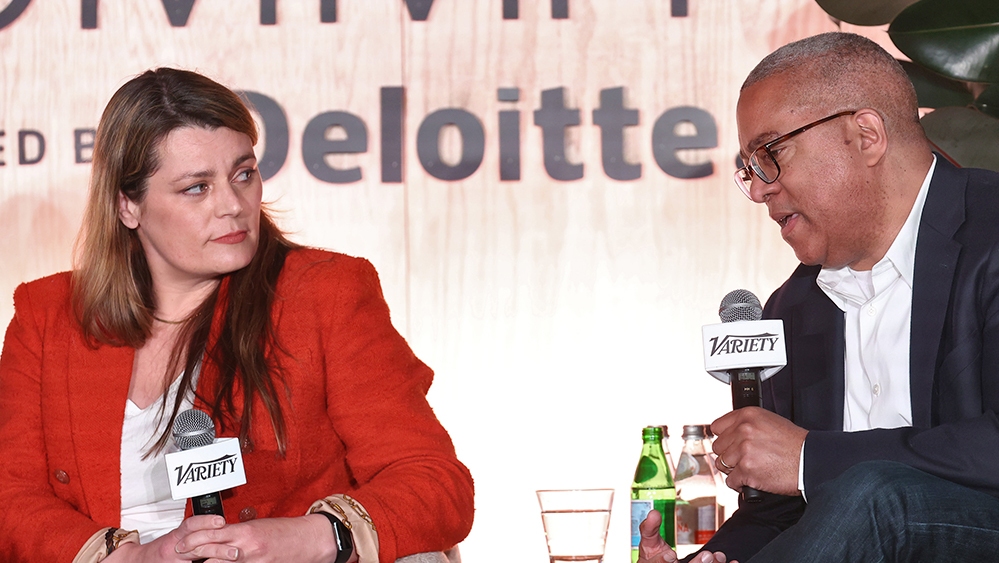Entertainment Marketers Talk TikTok, Tight Budgets and Going Viral
When it comes to entertainment marketing, TikTok is the new “ground zero.”
That was among the views expressed by a panel of five top film and TV marketing executives held Wednesday as part of Variety’s Entertainment Marketing Summit at the One Hotel in West Hollywood.
The lively conversation, moderated by Claudia Eller, Variety’s chief production officer, touched on the challenge of working with shrinking marketing budgets, the need to create bespoke content for an array of platforms and the thrill of scoring big with earned media and word of mouth. But the discussion became the most animated when the group discussed the outsized role that TikTok now plays in spreading the word on entertainment content.
“It’s democratized the ability for anyone to have a voice. It has exploded the entire space wide open,” said Christian Parkes, chief marketing officer for Neon. “It’s a place where we’ve shifted a lot of our investment and our advertising dollars there. We’ve been able to manufacture followings far quicker there than on other platforms. TikTok is ground zero right now.”
Catherine Halaby, TikTok’s head of entertainment for North America, discussed how the platform has expanded to work with entertainment companies to create content by thinking like a TikTok user.
“We’re here to support and help these companies and partners create like creators,” Halaby said. “We help them build relationships with users like the community on TikTok. They’re going to celebrate your wins by giving you their attention and interacting with your content. Our job is to help partners understand how to do that best and how to partner with [TikTok] creators.”
Dwight Caines, president of domestic marketing for Universal Pictures, offered a contrarian note by questioning whether gaining traction on TikTok is necessarily the path to getting people into theaters at a specific time.
“TikTok is a long-tail play, a place where we grow followers or engagement over time,” Caines said. “Sometimes that engagement doesn’t convert people into ticket buyers. I want quality views of my content. I want that community to combust and drive box office.”
Marc Weinstock, president of worldwide marketing and distribution for Paramount Pictures, added that the studio’s marketers pay close attention to search-term trends. “It’s a big proxy for us on success,” he said, but there still has to be some prompt or call to action to drive people to the box office. “If everyone’s out there saying everyone loves this, that alone won’t open a movie.”
Karen Bronzo, chief marketing officer for U.S. networks for Warner Bros. Discovery, addressed the juggling act that she has in overseeing marketing for nearly two dozen network brands, from TBS and TNT to Adult Swim and Cartoon Network to Discovery and Animal Planet. (As Eller read off the list of networks, Parkes quipped “When do you sleep?” Bronzo replied, “I don’t, really.”)
“It’s really about knowing the audience. We have to look at any given show and figure out who it’s for. There can’t be a one-size-fits-all approach,” Bronzo said.
Bronzo also pointed to the in-house wealth of marketing assets that Warner Bros. Discovery has through the breadth of channels under one roof after the 2022 merger of Discovery and WarnerMedia. That’s been an advantage at a time when marketing budgets are being squeezed.
“I have tremendous owned and operated assets. In a world where spending is tough, I have the ability to use our own platforms in a very robust way,” Bronzo said. “One of the benefits being part of a big company is we’re able to use our own properties when there’s not unlimited funds.”
Weinstock concurred, noting how important the support from other Paramount platforms was for building awareness on “Top Gun: Maverick.” “It had tremendous synergy through the whole company,” he said.
The marketing mavens swapped stories about big wins driven by creative ideas that connected with fans rather than big spending.
Weinstock was gleeful as he detailed the studio’s success last year with grassroots viral video efforts to support the low-budget horror movie “Smile.” One aspect of that was having people stand behind home plate in baseball stadiums delivering their best creepy smiles to the TV cameras. It took a little while for the public to pick up on the messaging – but once they did, it took off like a rocket.
Weinstock described this approach as “more for less” – in the case of “Smile,” that meant $200 million box office returns for a film that cost $15 million and had a “tiny” marketing budget.
“I was across town cursing him out,” Caines said of Weinstock. “It was a brilliant campaign.”
Caines offered his experience in working in a similar vein on the 2022 sleeper hit “M3GAN,” which featured a very scary-looking AI doll. Caines observed that the trick was to sprinkle out digital content and other early marketing messages that piqued interest but didn’t blow the entire secret out.
“The danger with ‘M3GAN’ is that we become a meme not a movie,” Caines said, citing the warning from his boss, Universal Pictures’ CMO Michael Moses. But when notable figures such as Megan Thee Stallion began tweeting about the film, the studio knew they were on the right track.
“The world and the audience has taken on the fun of ‘M3GAN.’ We have to make sure we amplify the scary thrills of an experiential theatrical release,” Caines said.
Parkes chimed in, noting that Neon got a lot of free media by offering moviegoers a free Botox treatment if they went to see the distributor’s recent release “Triangle of Sadness.” Weinstock laughed but quipped that Paramount’s lawyers never would have allowed such a promotion.
“We don’t have an army of attorneys to say no,” Parkes responded. “There’s two people who work in legal and they hate me… We’re always just trying to be a little bit different and a little bit subversive.”
(Pictured: TikTok’s Catherine Halaby and Universal Pictures’ Dwight Caines)

